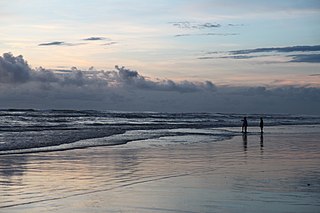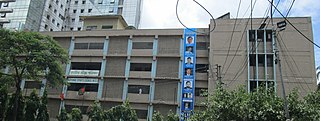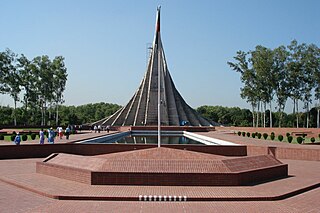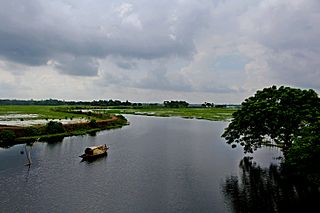
Bangladesh Agricultural University, was established in 1961. It is the first agricultural university, and also the second largest public university of Bangladesh. This university is located in Mymensingh. The university has 44 departments.

Dhaka Medical College and Hospital (DMCH) is a public medical college and hospital located in Dhaka, Bangladesh. It is the largest and most reputed medical college and hospital in the country. The hospital ranks among the top 20 worldwide, based on size and number of patients. Established on 10 July 1946, the college houses a medical school as well as a tertiary care hospital on its campus.

The University of Rajshahi, also known as Rajshahi University or RU, is a public research university located in Motihar, Rajshahi, Bangladesh. It is the second oldest and third largest university in Bangladesh. The university's 59 departments are organized into 12 faculties. It is one of the four autonomous university by the act (1973) of Bangladesh.

Cox's Bazar is a city, fishing port, tourism centre, and district headquarters in southeastern Bangladesh. Cox's Bazar Beach, one of the most popular tourist attractions in Bangladesh, is the longest uninterrupted naturally occurring sea beach in the world. Located 150 km (93 mi) south of the city of Chittagong, Cox's Bazar is also known by the name Panowa, which translates literally as "yellow flower." An old name was "Palongkee".

The National Sports Council (NSC) is the national overseer of the control authorities of 41 different sports in Bangladesh. It is responsible to the Bangladesh Ministry of Youth and Sports and is based in Purana Paltan, Dhaka.
Bangladesh Academy for Rural Development (BARD) (Bengali: বাংলাদেশ পল্লী উন্নয়ন একাডেমী started its journey on 27 May 1959 as a Training, Research and Action Research institute in rural development. The founder director of this academy dedicated to the leadership of Dr. Akhtar Hameed Khan, some researchers carried out continuous experiments with rural people and developed some model programs for rural development in this country. In the early sixties, the problems that were prevalent in rural areas were identified. The priorities of these programs are:

Hathazari is an upazila of Chattogram District in Chattogram Division, Bangladesh.

Sreemangal is an upazila of Moulvibazar District. in Sylhet Division, Bangladesh. It is located at the southwest of the district, and borders the Habiganj District to the west and the Indian state of Tripura to the south. Sreemangal is often referred to as the 'tea capital' of Bangladesh, and is most famous for its tea fields. Other than tea, the rubber, pineapple, wood, betel, and lemon industries also exist in the upazila.

Savar is an upazila of Dhaka District in the division of Dhaka, Bangladesh and is located at a distance of about 24 kilometers (15 mi) to the northwest of Dhaka city. Savar is mostly famous for the National Martyrs' Memorial, the national monument for the martyrs of the Liberation War of Bangladesh.

Kaliganj is an upazila (sub-district) of Gazipur District in central Bangladesh, part of the Dhaka Division.

Dumuria is an upazila of Khulna District in the Division of Khulna, Bangladesh.

Chittagong Veterinary and Animal Sciences University (CVASU) is a public research university in Chittagong, Bangladesh. It is the only specialised veterinary university in Bangladesh. It is located at Khulshi, Chittagong. Locally it is known as Veterinary University. Generally, the public universities in Bangladesh offer degrees on department. Like every other agricultural university in Bangladesh, CVASU offers degrees on faculty.

The University of Dhaka, also known as Dhaka University or DU, is a public research university located in Dhaka, Bangladesh. Established in 1921, it is the oldest active university in the country.

Kazi M. Badruddoza was a Bangladeshi agronomist who is credited with using Agricultural Genetics and Plant Pathology to extensively increase agricultural production in Bangladesh thus leading the nation toward self-sufficiency in staple cereal crops. He is known as the Father of Modern Agriculture in Bangladesh and the only National Emeritus Scientist of Bangladesh. He was one of the early leaders of the global team of the green revolution for his role in development of high yielding wheat, rice and maize varieties. For his work in Agricultural genetics, Badruddoza was awarded numerous honors, including the Independence Day award, the highest civilian award of Bangladesh. Prior to creation of Bangladesh as an independent state, he was also awarded the Tamgha-e-Imtiaz, a state organized civil award, in former West Pakistan, as well as the Tamgha-e-Pakistan. In addition, he is credited with the genetic engineering for the highly nutritious and large variety of guava, the Kazi Guava. In his honor, the genus of fungus, Kaziboletus. in the family Boletaceae, discovered in Bangladesh, was named after him.
Biotechnology and genetic engineering in Bangladesh is one of the thriving fields of science and technology in the country.

The national symbols of Bangladesh consist of symbols to represent Bangladeshi traditions and ideals that reflect the different aspects of the cultural life and history. Bangladesh has several official national symbols including a historic document, a flag, an emblem, an anthem, memorial towers as well as several national heroes. There are also several other symbols including the national animal, bird, flower, instrument and tree.
Chowdhury Sajjadul Karim was a Bangladeshi nuclear physicist and former advisor of the caretaker government led by Fakhruddin Ahmed. He was in charge of the Ministry of Agriculture, Ministry of Fisheries and Livestock, and Ministry of Environment and Forest.

The Government agencies in Bangladesh are state controlled organizations that act independently to carry out the policies of the Government of Bangladesh. The Government Ministries are relatively small and merely policy-making organizations, allowed to control agencies by policy decisions. Some of the work of the government is carried out through state enterprises or limited companies.

The Bangladesh Secretariat is the administrative headquarters of the Government of Bangladesh, and houses the majority of ministries and government agencies and bodies, located in Segunbagicha, Dhaka. The secretariat can refer to the complex of ministries, or refer to the Bangladesh Civil Service central administration. Its political heads are the ministers while the administrative heads are the Secretaries to the Government. The Secretariat complex was originally constructed as the Secretariat of East Pakistan.

The 1970s was a decade of the Gregorian calendar that began on 1 January 1970, and ended on 31 December 1979. It was a very significant decade in the history of Bangladesh, because this is the decade in which Bangladesh emerged as a sovereign state. The decade began with a devastating cyclone that ravaged the southern part of the country. The next year the country went into Liberation war and achieved independence from Pakistan. The government of Sheikh Mujibur Rahman administered the newly formed country between 1972–1975, but their rule soon came to an end through a series of coups and counter coups in the later part of the decade. Economically the country struggled because of the war (1971) and famine (1974) throughout the decade and was highly dependent on foreign aids. Culturally, in this decade Bangladesh started to establish its own identity as an independent nation.


















